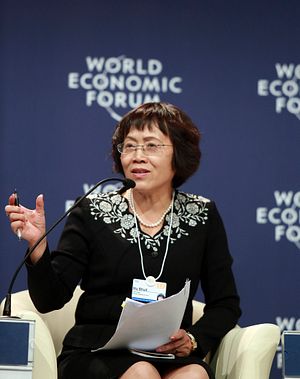While the Chinese media is generally regarded as little more than a swamp of propaganda and lies, amid the paludal newspapers and unctuous television programming is Caijing, a pathfinding biweekly business magazine.
Caijing‘s reputation was established when it provided data from the World Health Organization exposing the government’s cover-up of the 2003 SARS outbreak, months before Dr Jiang Yanyong’s letter to CCTV4 was published by Time, alerting the world to the issue.
When the 2008 Sichuan earthquake hit, Chinese coined the term “tofu sediment schoolhouse” to describe the cheaply-made buildings that crumbled like tofu during the disaster and left roughly 5,000 children dead. In a wonderful piece for The New Yorker, Evan Osnos writes that after families were threatened or paid to keep silent, and after the Propaganda Department restricted coverage of the rescue effort, Caijing published a 12-page report citing government incompetence but, crucially, declined to name names.
The ability to cover such highly sensitive stories without shying away from criticizing the government, and to do so without earning the government’s wrath, is what makes Caijing unique. Depending on the characters used, caijing can either mean “finance and economics,” the name of the magazine, or “to frame a shot,” as in film or photography. Hu Shuli, the magazine’s founder, often called the most dangerous woman in China, has proven herself adept at both. The kind of demagogic editorializing found in some larger Western publications is absent here. The magazine is as precise and emotionless as a scalpel.
However, critics point out that this scalpel delicately avoids arteries such as Falun Gong or the ethnic conflicts in Xinjiang and Tibet. In its defense, it is a business magazine and its focus on cases of fraud and corruption is therefore more appropriate. Even here, though, Caijing moves with care. According to Osnos, it often builds a story and then waits for the green light. So after Xinhua, the state-run newspaper, published a single sentence on the arrest of Shenzhen’s mayor for corruption, Caijing dropped a comprehensive analysis of the situation 29 minutes later.
But sometimes even Caijing strikes a nerve, the greatest one being a scandal it reported on in 2007 concerning a group of investors who paid less than $550 million for 92 percent of a corporation worth more than $10 billion. Authorities had the story revoked; it turns out some of those investors were children of Party leaders. And more recently, it was reported that Caijing‘s deputy editor lost his position after posting incriminating details on his Weibo account regarding a corrupt Reform Commission deputy minister.
Asked about the limits of reporting in China during an interview with Asahi Shimbun, Hu Shuli said, “Those outside of China only emphasize the difficulties. China will not be able to obtain the same freedom of the press as in the West overnight. I believe that is obvious.”
Some observers believe freedom of press in China is narrowing even further. Matt Schiavenza of The Atlantic writes, “Conditions for international media organizations in China have worsened under Xi Jinping… After Bloomberg and The New York Times published investigations into the financial largesse of top leaders, China blocked each website and refused to issue new visas to reporters sent to the country.”
While this may be, it hasn’t slowed Hu Shuli’s rise to power. In fact in 2010 she founded Caixin Media which, in addition to Caijing, now also publishes Century Weekly, China Reform, and Comparative Studies. And each of these have the same critical approach that has made Caijing the indispensable read that it is.
Here, one is perhaps reminded of the Chinese classic Water Margin, in which the brilliant analyst and master of words Wu Yong helps defeat the incompetent chief Wang Lun and saves the lives of his fellow outlaws several times. It is a conceit, but like Wu Yong, Hu Shuli inhabits a swamp – the swamp of Chinese media – and similarly confronts incompetent government officials while, in a sense, defending her fellow outlaws, i.e. journalists. But unlike Wu Yong, who considers the government beyond redemption, Hu Shuli is a patriot who hopes to improve the system from within.
This will not be easy. The 2014 Press Freedom Index, published by Reporters Without Borders, ranks China 175 out of 180 countries, 25 places below Russia and only 4 places above North Korea. And now that Beijing has, in the wake of the Charlie Hebdo shooting, registered its voice with a growing chorus of deliberation over responsible free speech, it’s fair to ask to what extent Chinese media can be taken seriously. For now, the answer is Caijing.
































